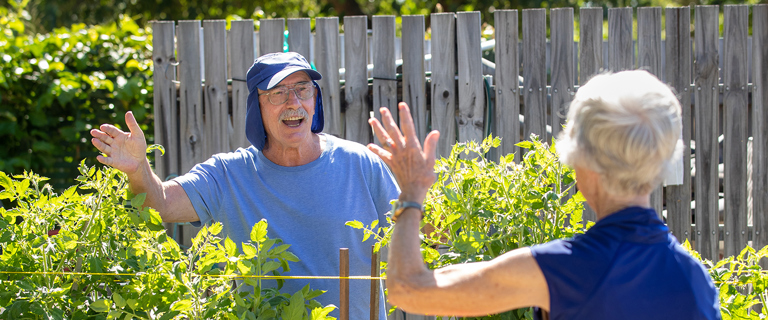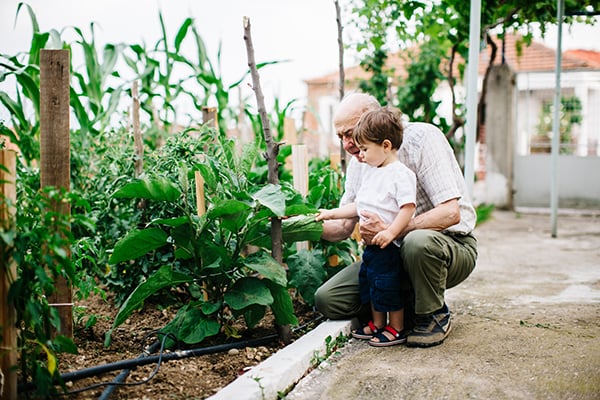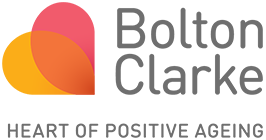How to Age Well

Australians are living longer than ever before. Research shows living a healthy lifestyle will improve your chances of ageing well. Experts say social connection, healthy eating, exercise, mindfulness and important for improving your wellbeing.
Six core areas that can help you age well are:
- Connection – keeping in touch with others
- Healthy eating – fuelling your body with nutritious food
- Movement – staying active to boost your fitness and energy levels and support better sleep.
- Mindfulness – being present and having a calm mind
- Positive thinking – reducing worry, doing things you enjoy and setting personal goals
- Learning – remain curious and keep learning new things
Social connection - why it's important
Research shows building and maintaining social connections is important for physical, psychological and social wellbeing. Friendship has one of the highest positive correlations with self-rated happiness and is also important in managing illness and other challenges.
Connecting is about building positive relationships with the people around us including family, friends, neighbours, colleagues and our local community. Joining a local community group, a sports club or a special interest group in person or online can be a good place to start. Taking part in an activity that has meaning for you makes talking to other people easier and is a good way to share interests.
The local newspaper or community centre will have information about what’s going on in your area. You can also try volunteering, which is a great way to meet new people and do something that makes you feel good. Keeping intergenerational relationships strong – for example by playing with your grandchildren or attending an intergenerational play group – is a good way to stay connected. If you are keeping in touch via video calls or online you can use free tools like the Hello Nan and Pop pack to support family conversations.
Fuelling your body - getting nutrition right
As we get older, we may need fewer kilojoules, but we still need the same amount of nutrients – sometimes more. It’s important to eat a variety of foods – you might have heard the term “Eat a Rainbow”. This means getting as much colour into your food as possible – for example, plenty of different coloured fruits and vegetables. This goes hand in hand with a more natural, less processed diet which is better for your physical and emotional wellbeing
Cooking and sharing a meal with others is not only a great social activity, but it can help stimulate your appetite – and it doesn’t have to be difficult. Try the quick and easy healthy recipes in our Be Healthy and Active video here.
Get moving for fitness, strength and balance
Being physically active is also good for your body, your mind, your health and your mood. Physical activity increases blood flow to the brain, helping with growth of new brain cells. It also improves your wellbeing and helps reduce stress and anxiety.
Find activities you enjoy that keep you moving. Everyday activities such as cleaning the house, getting out in the garden or running errands can be great for staying active. Try taking the stairs rather than the lift or doing a simple challenge like touching your toes each morning.
You can download resources about low impact exercises here.
Keep learning
Scientists have found that challenging the brain with new activities builds new brain cells and strengthens the connections between them. Learning can improve your self-confidence, help fight depression and help you meet new people. Try learning a new language, doing an online course or cooking a new recipe. A simple challenge for your brain is to use your non-dominant hand for things like brushing your teeth, stirring your coffee or opening doors.
About Bolton Clarke
Bolton Clarke is the new face of RSL Care + RDNS. Together we have provided healthcare and aged care services for more than 200 years. We are one of the largest Australian owned and operated not-for-profit healthcare and independent living service providers, with a passion for ensuring our customers live the best possible life. We provide reliable, trustworthy, quality care and support and living options across Retirement Living, Residential Aged Care and Home and Community Support.
Download a PDF version of this white paper here.
Be Healthy and Active
Free health and wellbeing sessions
Bolton Clarke’s Be Healthy and Active program provides free, practical sessions to help you get the most out of life.

Recent white papers
Information for consumers on topics about health, wellbeing and active ageing.

